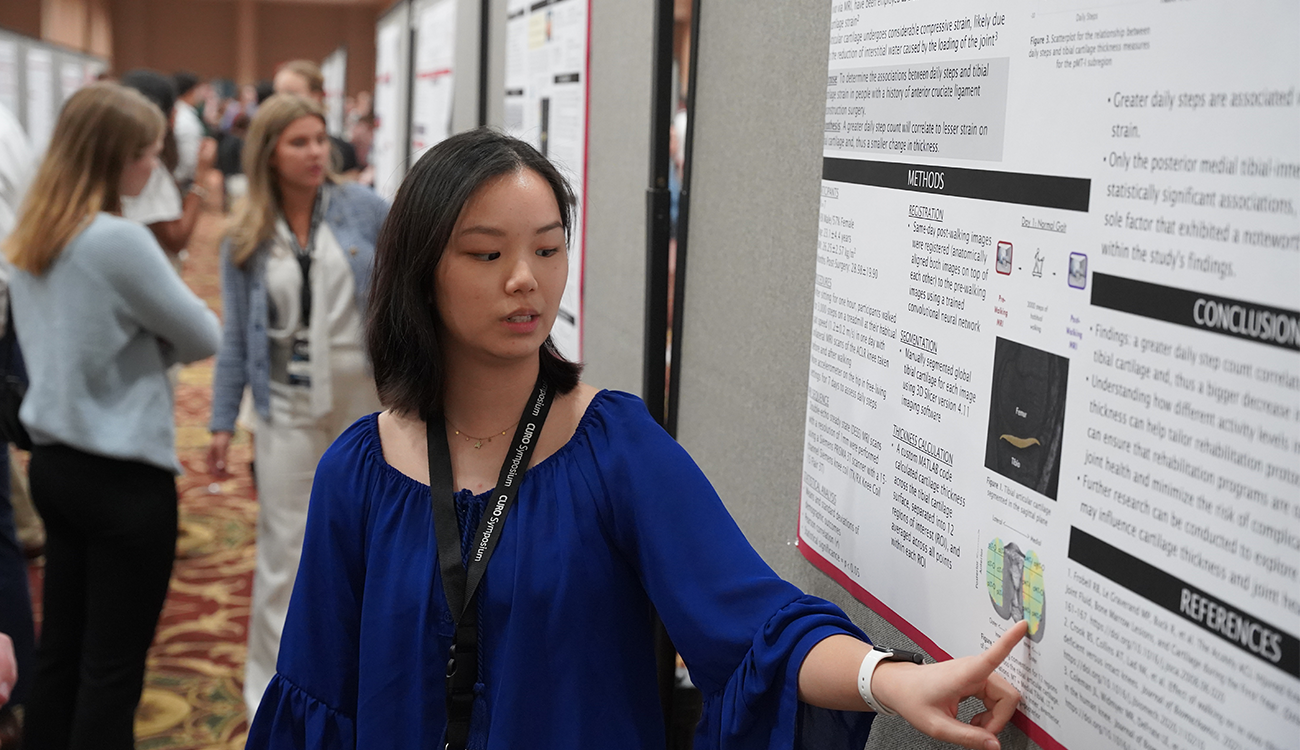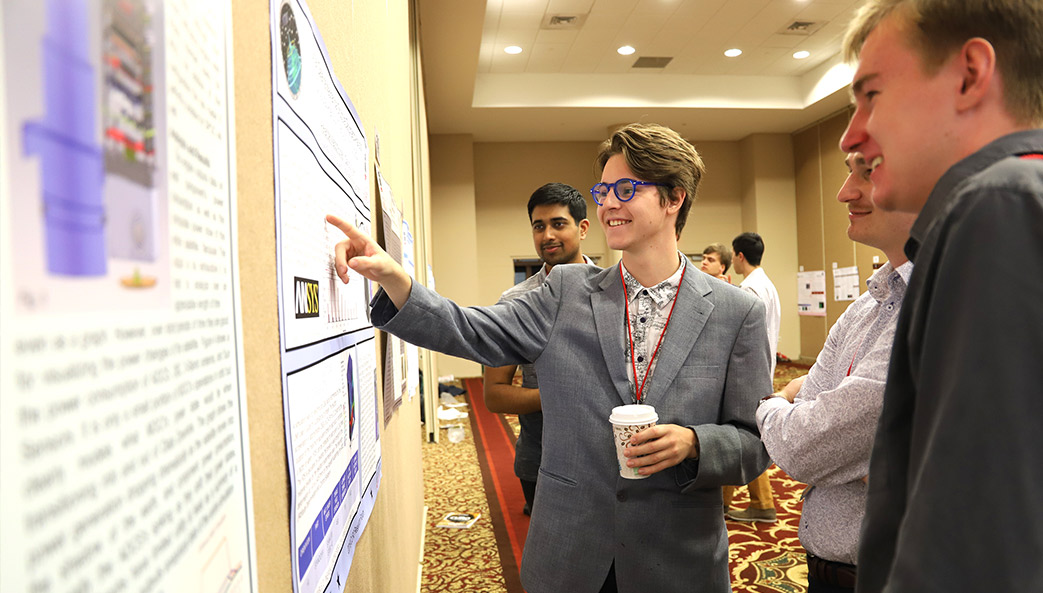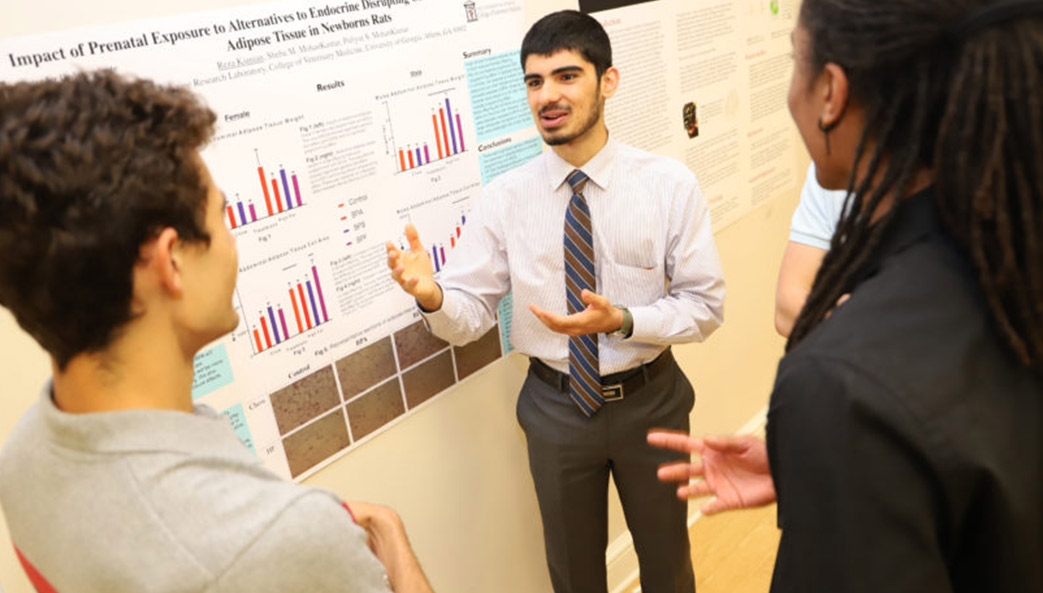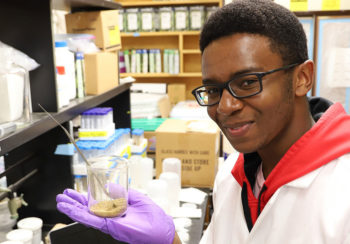University of Georgia undergraduate students came together to showcase their individual research projects and achievements on April 8-9 at the Center for Undergraduate Research Opportunities (CURO) Symposium.
For 25 years, the CURO Symposium has served as an opportunity to highlight the breadth and depth of undergraduate research across multiple disciplines. CURO enables undergraduates to engage in faculty-mentored research as early as their first year, regardless of discipline, major, or GPA. The program supports students in discovering and seizing opportunities, selecting mentors, and showcasing and disseminating research.
“Students benefit in so many ways, including hands-on experience that goes beyond what they learn in the classroom,” CURO Program Coordinator Andrea Silletti said. “They have the ability to contribute to the body of knowledge in their chosen fields, and mentors get support for their own research endeavors while also training the next generation of scholars.”
The two-day event took place at the Classic Center and included a keynote address by Ron Walcott, vice provost for graduate education and dean of the Graduate School. Walcott also serves as a professor in the College of Agricultural and Environmental Sciences Department of Plant Pathology.
“The CURO Symposium is a lot like a seed,” Walcott said in his keynote address. “It’s like a seed that was planted 25 years ago and has positively impacted the lives of many students, whose careers have blossomed and are now producing seeds of their own.”
The 2024 Symposium featured 623 undergraduates pursuing 188 different majors from 16 schools and colleges. Almost 280 faculty members from 75 departments served as mentors. This year’s symposium featured new components, such as Cafe CURO, an opportunity for students and mentors to network over coffee, and a training session for graduate student mentors.
“This year’s symposium turned out even better than we could have imagined,” Silleti said. “We had a significant increase in the number of student presentations this year and the feedback we’ve gotten so far from participants and audience members has been fantastic.”
Cecilia Rhine is a third-year exercise and sports science student in the Mary Frances Early College of Education. Rhine’s project studied the effects of daily step counting on the strain of tibial cartilage. With a step intervention that aimed to increase participants’ daily step counts, she hypothesized that there would be a smaller decrease in cartilage thickness with greater daily steps.
“This is because I thought ‘conditioning’ of the knee would mean that the cartilage wouldn’t compress as much with more load presented on the knee,” Rhine said. “After all, it’s gotten used to having that much weight on the knee.”
After seeing her friend participate in CURO during her freshman year, Rhine wanted to do the same before she graduated.
“This journey not only provided me with valuable research experience but also fostered meaningful connections with scholars in the same field as me and supported my academic pursuits,” she said. “I know that research is an important part of kinesiology and science, which is why I wanted to be a part of it during my undergraduate studies.”
After she finishes her degree, Rhine plans to go to physical therapy school to eventually earn a Doctor of Physical Therapy license.
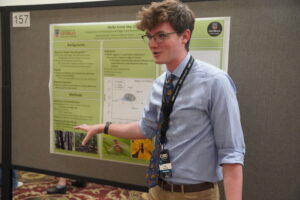
For Riley Forrestall, a third-year student double majoring in plant biology and ecology, this is his second time presenting at CURO. His project, titled “Comparison of Forested and Edge Communities of Flower Flies (Syrphidae),” is part of a larger study headed by CAES Department of Entomology Graduate Research Assistant Miriam Edelkind-Vealey that focuses on pollinator communities in the forest. Forrestall specifically focused on hover fly (Syrphidae) communities and how they might change between forest interior and edge communities.
“I grew up appreciating flowers and making sense of how nature is connected, so that’s why this research means so much to me,” Forrestall said.
After he graduates next year, Forrestall plans to pursue a master’s degree in evolutionary botany and entomology. Eventually, Forrestall hopes to become a professor of ecology or evolutionary biology and botany and continue his research on the origins of different species.
Thinking about the future of CURO, Silletti hopes to see an increase in presentations from non-STEM fields, such as the arts and humanities, and creating a better sense of community among UGA’s undergraduate research scholars.
“Overall,” she said, “I hope we continue to engage students across campus in projects that excite, educate, and prepare them to be successful, whatever their goals.”



